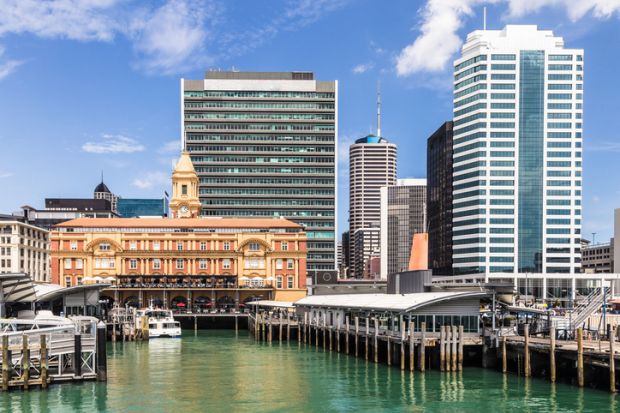
How much does it cost to study in New Zealand? If you are interested in studying in New Zealand, one of the most important things to consider is how much everything is going to cost. This essential guide breaks down the cost of every aspect of university life to ensure that you have everything covered.
Note that prices and exchange rates are correct at the time of publication and may vary from those shown here.
Tuition fees
There are eight main universities in New Zealand and they all set their own tuition fees, which will vary depending on subject and level of study. However the New Zealand government has confirmed plans to abolish tuition fees from 2018 for one year of study, increasing to three years of study from 2024. This is for domestic students or for students that have been living in New Zealand prior to applying to university.
Most international students are expected to pay more than domestic students, although international students can be exempt from paying foreign student fees in some cases – for example when students are enrolled in PhD programmes.
On average, an international student can expect to pay between NZ$22,000 (£11,535) (all figures from now are in New Zealand dollars) and $32,000 (£16,778). there may be higher fees for certain such as medicine and veterinary science.
For postgraduate degrees fees range from about $26,000 (£13,632) to $37,000 (£19,400) with higher fees for subjects such as medicine and veterinary science. A PhD programme in New Zealand for an international student can cost between $6,500 (£3,400) to $9,000 (£4,718) per year for most subjects. PhD programmes cost the same for domestic and international students.
For a domestic student, an undergraduate degree comes in at between $6,000 and $10,000 per year (£3,145-£5,243), with postgraduate degrees between $7,000 and $10,000 (£3,666-£5,237).
As well as tuition fees, some universities will also charge administration and student services fees; for example the University of Auckland charges students $943 (£493). This will vary across the universities.
The full list of tuition fees and a comparison of costings are available on the Te Pōkai Tara site, which represents all universities in New Zealand.
Whether studying at undergraduate or postgraduate level, students will be expected to prove that they have sufficient funds to support themselves, which is $1,250 (£654) per month for any study period less than nine months, and $15,000 (£7,856) per year if the stint is longer. This amount is surplus to the amount needed to cover your course fees and return airfare.
Accommodation costs
There are several possible options for renting during a period of study in New Zealand. You could stay in student residence halls ($200 or £104 per week, on average), a shared flat ($120/£62 per week) or a private flat ($180/£94 per week).
Accommodation costs for flats and houses can vary widely across the country. For example the average weekly rent for a three to four-bedroom house in Auckland was $565 (£295) or $640 (£335) in Auckland.
Best universities in New Zealand
International perspective: a Sri Lankan student in New Zealand
#UniAdviceWeek: a Chinese student studying in New Zealand Takes over our Twitter account
International perspective: a Chinese student in New Zealand
University life in: New Zealand
Scholarships for international students in Australia and New Zealand
Kia Kaha: shining a light into darkness in New Zealand
Other essential student costs
The average monthly phone bill in New Zealand is $20 (£10) and an internet plan is $70 (£36) per month, split between the tenants of the flat, as well as $100 (£52) per month (per person) on utilities such as gas, electricity and water. Students should expect to spend $500 (£261) on books and other academic supplies per year.
A one-way ticket on public transport costs an average $2.50 (£1.31), with a monthly pass at $150 (£78). Most cities will have discounted student fares that students can take advantage of. One example is Auckland’s HOP Card, which provides students with discounts on ticket prices across the transport network.
The healthcare system in New Zealand is commendable – you will pay between $25 and $60 (£13-31) to see a doctor, and hospital costs are paid for by the state, while prescriptions are $5 (£2.60). You must be covered by medical and travel insurance policies while you’re studying in New Zealand, from the point at which you enrol until your visa expires. Health insurance is affordable even for international students – for example, 12 months of health and travel insurance cover with StudentSafe (a popular choice with students) costs $590 (£309).
Lifestyle
The average student’s weekly shop in New Zealand costs $70 (£36) and a meal out in an average restaurant is $20 (£10). A beer in a bar is approximately $9 (£4.20) and a glass of wine is $8 (£4).
A cinema ticket will cost about $15 (£7) and a monthly gym membership costs about $40 (£20) but this can vary greatly depending on the type of package you go for. A Big Mac is priced at $5.20 (£3). In Auckland, New Zealand’s largest urban area, a mid-range dinner for two, a bottle of wine, two cinema tickets and a five-mile taxi ride home costs $152 (£80).
What financial support is available
Unfortunately, there are few scholarships available for international students studying in New Zealand.
Scholarships are offered by the New Zealand government. There is a useful search tool on the Education New Zealand website, with which you can search for a scholarship depending on your subject and study level.
However, full-time students are allowed to work up to 20 hours a week but it is important to check the terms of your visa, and the visa authorities may need to be contacted should you choose to work. The adult minimum wage in New Zealand is $18.90 (£9.90) per hour.
A popular choice for obtaining student discounts is the $20 (£10.50) StudentCard, which offers more deals than any other card. There are discounts on clothes, travel, food, drinks and entertainment. Air New Zealand also offers a student discount on air fares.
Read more in this series
The cost of studying at a university in the United States
The cost of studying at a university in the UK
The cost of studying at a university in Germany
The cost of studying at a university in Canada
The cost of studying at a university in France
The cost of studying at a university in Australia
The cost of studying at a university in the Netherlands
The cost of studying at a university in China
The cost of studying at a university in Japan
The cost of studying at a university in Brazil






















Have your say